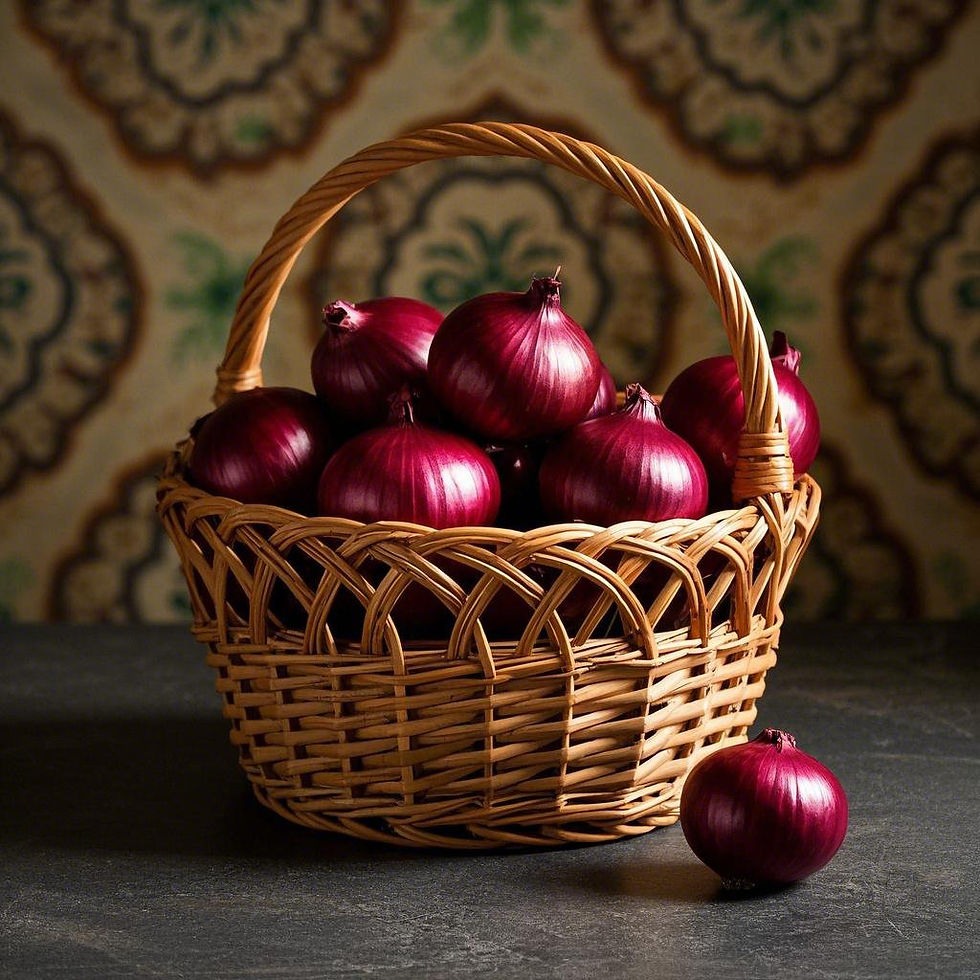Essential advice for importers: How do you choose the right onions before buying in bulk?
- Al Hawam

- Apr 26
- 3 min read
In light of the growing global demand for agricultural products, onions are one of the main commodities that are widely imported due to their role in the food industry and daily consumption. However, the process of importing onions in large quantities is not a random decision, but requires careful evaluation of technical specifications, logistical and legal aspects to ensure quality and avoid losses. Here are the most important specifications to consider when choosing the right onions to import from export traders:

1. Quality and appearance
Firmness and flawlessness of the fruit: Onions should be firm to the touch, free from softening, cracking or mold.
Uniform color: Look for fruits of uniform color (red, yellow, or white) depending on the variety, avoiding fruits that show dark spots or signs of rot.
Consistent size: Choose a standardized size for ease of packing and marketing, with a suitable diameter (usually between 5-10 cm depending on the use).
Onions are free of dry roots and leaves: Remove excess roots and leaves to ensure safe storage and minimize the risk of spoilage.

Hardness, uniform color, consistent size, and freedom from visible defects are basic conditions that must be met for imported onions.
2. Quality and variety for the target market
Varieties vary by use:
Yellow onion: Used in everyday cooking for its balanced flavor.
Red onions: Preferred in salads and fresh dishes.
White onions: Common in Mexican and European cuisine.
Shelf life: Choose varieties with a long shelf life (such as dry storage onions) if the logistical journey is long.
3. Safe Packaging
Packing materials: Burlap, a type of fabric made from the fibers of the jute plant, should be used for packing and storing crops such as onions and potatoes because it allows good ventilation, which helps preserve the crop for a longer period, as well as plastic bags made of woven polypropylene, which is characterized by its resistance to moisture and water, in addition to being well ventilated and more durable than jute bags, or using wooden boxes or strong corrugated cartons that allow ventilation and protect the fruits from moisture and collision.

Pack onions in sturdy, ventilated containers to preserve their safety and quality Clear labeling: Ensure labels contain shipping information, harvest date, country of origin, and batch code.
Refrigerated storage: If required, make sure the merchant adheres to storage conditions at temperatures between 0-4°C to preserve quality.
4. Exporter's reputation and review of records
Previous experience: Check the trader's export history by requesting past samples or reviewing customer reviews.
Ability to fulfill large orders: Make sure the exporter has the necessary infrastructure (e.g., warehouses, transportation network) to deliver the required quantities on the agreed-upon dates.
Transparent contracting: The exporter should provide a clear contract that includes clauses on compensation in case of damage or delays.

5. Financial analysis and commercial terms
Cost versus quality: Don't sacrifice quality in favor of low cost, as poor quality fruit can lead to greater losses.
Secure payment terms: Negotiate payment terms that protect your interests, such as using Letter of Credit to minimize risk.
Shipment insurance: Get insurance that covers the risk of damage or loss during transportation.
6. Logistics and Transportation
Choose the right mode of transportation: Air freight is faster but expensive, while sea freight is suitable for large quantities but requires careful time planning.
Monitor transportation conditions: Avoid exposing onions to high humidity or direct heat during transportation.
7. Test samples before purchasing

Don't rely solely on paper specifications; ask for samples of the batch to be imported for laboratory testing to ensure they meet the agreed specifications.
Bottom line: Importing onions smartly
Choosing the right onions to import requires a balance between quality and economic efficiency, while adhering to international standards and building reliable partnerships with exporters. Don't hesitate to use agricultural experts or import agents to review contracts and inspect shipments, especially if you're new to the industry. These steps will ensure that you get a high-quality product that satisfies your customers and protects your investment from unforeseen risks.




Comments